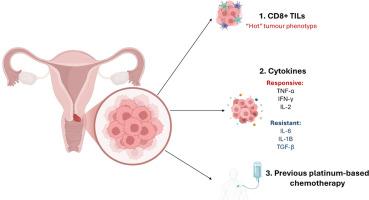在低收入国家推进个体化医疗:宫颈癌免疫治疗反应的预测指标
IF 2.5
3区 医学
Q2 ONCOLOGY
引用次数: 0
摘要
世界卫生组织报告说,宫颈癌是世界上第八大最常见的癌症,也是导致癌症相关死亡的第九大原因。它也是25个国家(主要在撒哈拉以南非洲)妇女中最普遍的癌症。因此,子宫颈癌继续对全球健康构成重大挑战,特别是由于对该疾病晚期可用的治疗选择有限。显然,免疫治疗是一种很有前途的策略,但其疗效在不同的患者中是不同的。因此,预测指标对于识别最有可能从免疫治疗中受益的患者和指导治疗决策至关重要。本文综述了宫颈癌免疫治疗中预测性生物标志物的现状,包括免疫检查点分子、肿瘤突变负担和免疫细胞浸润。我们进一步讨论了其他因素,如细胞因子、肿瘤浸润淋巴细胞和既往铂类化疗暴露。随着该领域的不断发展,需要不断的研究工作来完善预测生物标志物,并优化LMICs患者选择,以用于宫颈癌的免疫治疗。本文章由计算机程序翻译,如有差异,请以英文原文为准。

Advancing personalized medicine in LMICs: Predictive indicators for cervical cancer immunotherapy response
The World Health Organization reports that cervical cancer ranks as the eighth most common cancer worldwide and is the ninth leading cause of cancer-related deaths. It is also the most prevalent cancer among women in 25 countries, primarily in Sub-Saharan Africa. Consequently, cervical cancer continues to pose a significant global health challenge, particularly due to the limited treatment options available for advanced stages of the disease. Evidently, immunotherapy is a promising strategy, but its efficacy is variable among patients. As such, predictive indicators are essential for identifying patients who are most likely to benefit from immunotherapy and for guiding treatment decisions. This review provides an overview of the current landscape of predictive biomarkers in cervical cancer immunotherapy, including immune checkpoint molecules, tumor mutational burden and immune cell infiltration. We further discuss additional factors such as cytokines, tumor infiltrating lymphocytes and previous exposure to platinum-based chemotherapy. As the field continues to evolve, ongoing research efforts are needed to refine predictive biomarkers and optimize patient selection in LMICs for immunotherapy in cervical cancer.
求助全文
通过发布文献求助,成功后即可免费获取论文全文。
去求助
来源期刊

Seminars in oncology
医学-肿瘤学
CiteScore
6.60
自引率
0.00%
发文量
58
审稿时长
104 days
期刊介绍:
Seminars in Oncology brings you current, authoritative, and practical reviews of developments in the etiology, diagnosis and management of cancer. Each issue examines topics of clinical importance, with an emphasis on providing both the basic knowledge needed to better understand a topic as well as evidence-based opinions from leaders in the field. Seminars in Oncology also seeks to be a venue for sharing a diversity of opinions including those that might be considered "outside the box". We welcome a healthy and respectful exchange of opinions and urge you to approach us with your insights as well as suggestions of topics that you deem worthy of coverage. By helping the reader understand the basic biology and the therapy of cancer as they learn the nuances from experts, all in a journal that encourages the exchange of ideas we aim to help move the treatment of cancer forward.
 求助内容:
求助内容: 应助结果提醒方式:
应助结果提醒方式:


